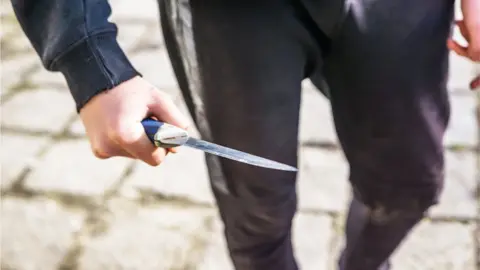Stop and search: 9,000 under-18s in Wales checked
 Getty Images
Getty ImagesChildren as young as seven are among thousands of under-18s stopped and searched by police in Wales.
In the four years up to March 2019, more than 9,000 children and young people were searched by officers.
Fewer than a tenth of those were arrested.
Campaigners argue that stopping and searching children is "profoundly disturbing", but police say it can "protect them and others from serious harm".
Between 2015 and 2019, children as young as seven were stopped by officers in south and north Wales.
Stop and search powers are controversial, with fears they can be misused and can target black people disproportionately.
But with knife crime on the increase, Welsh forces say stop and search is important to protect communities and deter people from committing crimes.
Figures obtained by BBC Wales after a Freedom of Information request show the number of stop and searches on under-18s increased last year.
In the South Wales Police area, 1,978 children were searched under the power between March 2018 and 2019, up from 1,265 the previous year - a 56% rise.
In Gwent, the number stopped more than doubled in the same period, from 201 to 410.
In both forces, the proportion of arrests resulting from the checks fell.
In the same period, 274 children were stopped and searched in the North Wales Police area.
Dyfed-Powys Police officers searched 562 children, but none of these searches resulted in arrest.
Children under the age of 10 cannot be arrested due to being under the age of criminal responsibility.

'Long lasting impact'
 Getty Images
Getty Images Rosalind Comyn, at human rights group Liberty, said the use of stop and search on young children was "profoundly disturbing" and likely to lead to mistrust of the police from a young age.
"Treating this intrusive tactic as a cure-all for tackling crimes ignores the corrosive effect its misuse can have on relationships with communities the police are supposed to serve, undermining fair and effective policing in the long term," she said.
Katrina Ffrench chief executive of campaign group StopWatch, said the statistics showed children were being "over policed and coming into contact with the police unnecessarily".
"The decrease in the arrest rate highlights that stop and search is not being used in an effective manner.
"With the impact of a stop and search encounter potentially being long lasting, especially for children, it is essential that forces are held to account for their practices".

What do police say?
Historically, arrest rates from use of stop and search are low.
Last year, just 5% of the people searched across England and Wales were arrested for an offence - comparably the number for children in Wales was higher at 7.13%.
South Wales Police said the increase in the number of stop and searches was down to more proactive patrols to tackle County Lines drug gangs and knife crime.
Supt Steve Jones, force lead for stop-search, said officers were using an intelligence-led approach and the process was monitored to ensure it was used in a non-discriminatory manner.
"Stop-search is one of many important tools the police use to deter and prevent crime in order to keep our communities safe," he said.
Gwent Police said as well as targeting those who may be carrying weapons, officers were trying to stop children carrying knifes through education.
Ch Insp Martyn Smith said: "It is a sad fact that young people are far more likely to be a victim of knife crime, and we are committed in our efforts to protect them and others from serious harm."
North Wales and Dyfed-Powys Police have been asked to comment.
